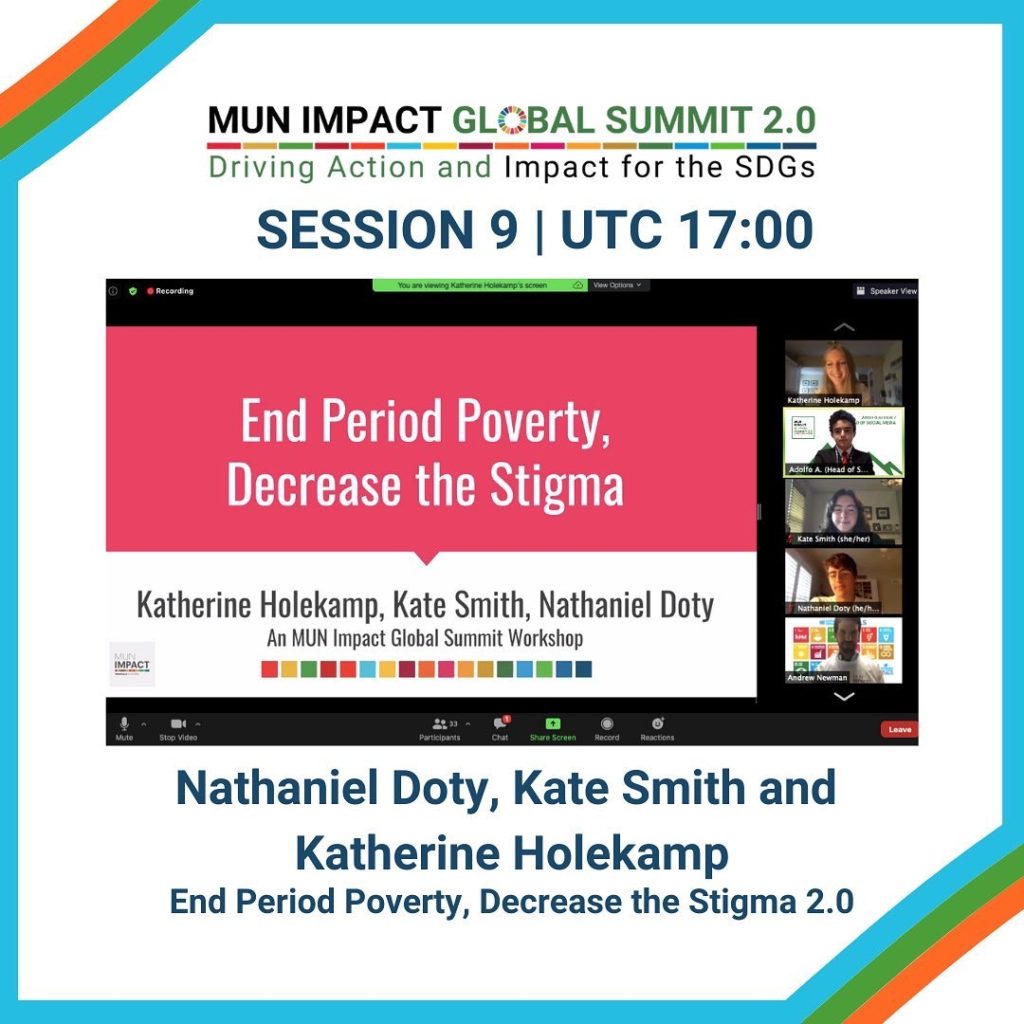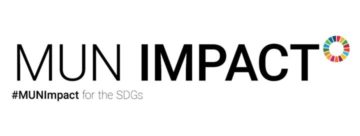
By Neha Varadharajan
–
The taboos associated with menstruation and period poverty were put down with a badge of honor at one of the most exciting sessions at the MUN Impact Global Summit 2.0: a throwback to a workshop held at the last Summit and brought back by popular demand, “End Period Poverty, Decrease The Stigma 2.0”!
The presenters- Katherine Holekamp, Kate Smith and Nathaniel Doty- kicked off the much awaited presentation with a description of what period poverty actually is. “Period poverty is the circumstance of being unable to afford necessary menstrual hygiene products”, they said.
Then they went on to discuss the shocking statistics that associate with period poverty and elegantly brought attention to the issue that requires much addressal. The participants came to know that 60 percent of women in developing countries have no access to adequate menstrual products, and that an average woman spends about 18,000 USD on period products in her lifetime, among other facts. It was truly fascinating to know about, and had just touched upon the gates of a big mansion that was yet to open.
A shocking statistic set the tone for the workshop- they said and all the participants now quote, “100 percent women deal with the stigma associated with menstruation and period poverty.”
They went on to study a geographic overview of countries and their access to sanitation and period products, including Nepal, USA and Uganda, which provided materialistic evidence for the facts introduced at the beginning of the workshop. The presenters explained with perseverance, quality and pinpoint precision.
While the information was overly interesting and wonderful to take in, a heart-wrenching quote on their presentation read, “How many of you feel uncomfortable discussing periods, pads and tampons? We must stop stigmatizing periods.”
The workshop couldn’t be more touching. They went on to discuss the SDGs and their association with period poverty, including the obvious ones like SDG 3: Good Health and Well Being and SDG 5: Gender Equality, but also those overly unexpected ones like SDG 4: Quality Education and SDG 8: Decent Work and Economic Growth. Apparently, we didn’t think of the fact that girls around the world may miss school due to falling sick from inadequate menstrual hygiene, and the same goes for women who may otherwise be able to work regularly as independent women and make a living.
The fact that the collective future of humanity and eradicating period poverty depended on the future of women and vice versa was synonymous with their presentation and workshop.
“But there’s still hope..” they said. And oh, how true it was, the participants thought, as they went into possible solutions as a call to action.
UNICEF, Dignity Period and a Period Tracker App were the existing solutions they discussed in vivid detail, along with cost-cutting solutions both real and virtual that could result in more affordable menstrual products- one of them being the elimination of VAT because women pay incredibly high tax rates for period product investments.
They then discussed their own drive: the GEO Tampon Drive. They used the MUN Impact Planning Tool to shape their initiative and inspire others to do so. They planned to push some SDG Targets and get inspired to start a tampon drive with SMART solutions. They then asked themselves questions to address surrounding the issue of period poverty, all of which were filled with vital information. Then they went on to shape their initiative- the Gender Equity Organization to send menstrual products to deserving women and girls, and raising awareness through social media and collaboration, among others. They laid out synonymous goals, project dates and duration, team members and approvals, which assured the participants that the drive was a dream come true for those who don’t have adequate access to menstrual hygiene.
“Increase awareness, decrease stigma”, they emphasized upon, and brought to the participants mottos to focus on the goals they planned to turn into realities. They laid out their project wonderfully and showed the world that they could make a big change, with distribution partners facilitated and results showcased- it was truly a proud moment for all the women and girls who aspire to see a world where period poverty is no longer a prevailing taboo.
They told the participants how to take action with a plan designed to rival every other, including showing love and support on social media and online, and communications and networks to introduce awareness and change. A lovely Q and A session succeeded the presentation which showed that the participants loved the presentation and were willing to contribute to change.
“You can do it,” they said proudly. So did we.
The full recorded session of this workshop can be accessed here.
